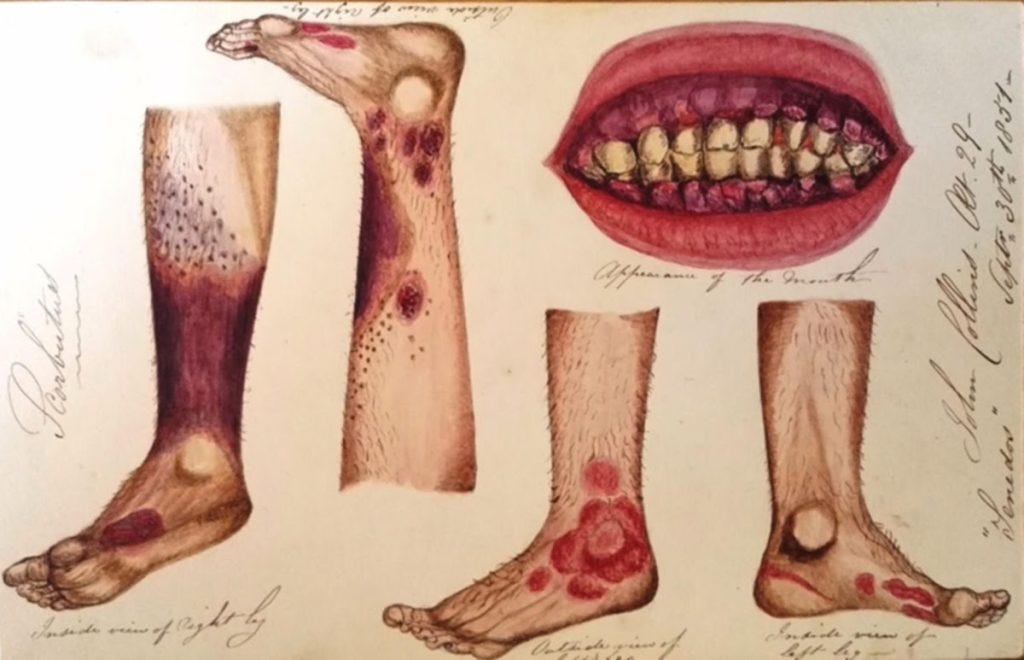Vitamin C: Scurvy Savior or Immune Overdose? More of a Good Thing Isn’t Always Better
The dose makes the poison with ALL things, even essential micronutrients.
Note: this article appeared originally in my monthly Skeptical Inquirer column, Inside Immunity.
And - we are a week and a half out from this year’s CSICon, also hosted by the same organization that publishes SI. The speaker lineup is really great - I am honored to be among such a diverse and esteemed cohort. If you’re in the Vegas area and want to check out some skeptical scientific discussions, consider registering!
But let’s get into it.
The dietary supplement industry is lucrative; it’s currently valued at $177.5 billion dollars globally. The market exploded in the United States after the passage of the 1994 Dietary Supplement Health and Education Act. This legislation, passed under the guise of medical freedom, aimed to create a profitable marketplace of unregulated products targeting people with a desire to take charge of their health.
With this came unfounded claims and promises of miracle panaceas: products that protect you from infection, boost your immune system, fend off cancer, and increase overall health. The poster child for the modern obsession with dietary supplements? None other than vitamin C.
Like all pseudoscience, hype around vitamin C is based on a nugget of truth: it is an essential micronutrient.
That prefix micro is important: you only need tiny quantities of this chemical for the bodily functions it participates in. While many people operate under the premise that more of something beneficial must be better, the reality is that there is such a thing as too much of a good thing.
Vitamin C, chemically (5R)-[(1S)-1,2-dihydroxyethyl]-3,4-dihydroxyfuran-2(5H)-one, common name ascorbic acid, is a water-soluble chemical found in many fruits and vegetables. It is found in high levels in many foods, including berries, kiwi, broccoli, bell peppers, brussels sprouts, and yes, citrus fruits.
Vitamin C’s association with citrus is rooted in the history of scurvy, which occurred nearly 200 years before the chemical itself was even identified.
Scurvy is a disease that occurs as a result of vitamin C deficiency. It was particularly prevalent from the 1400s to the 1700s among sailors exploring the “new world” who didn’t have access to fresh produce. Symptoms of scurvy start with fatigue, weakness, leg pain, and irritability and progress to gingivitis, anemia, poor wound healing, bleeding issues, and joint swelling. If not treated, it can progress to internal bleeding, organ failure, and death.
The association between citrus and scurvy prevention was a major medical breakthrough in the eighteenth century, largely attributed to James Lind, a British naval surgeon. While history recalls him as a revolutionary who conducted one of the first clinical trials that led to this conclusion, ironically, his Treatise of the Scurvy (1753) included quite a bit of pseudoscience as well.
That being said, whether luck or legitimate scientific inquiry, his work on the HMS Salisbury allowed him to determine that providing sailors with citrus fruits—and not other treatments: cider, sulfuric acid (elixir of vitriol, how apt), vinegar, seawater, or garlic and mustard—substantially improved clinical symptoms of scurvy.
Starting in 1795, the British Navy began to issue rations of citrus to sailors, which functionally eradicated scurvy, save for periodic outbreaks after the switch to West Indian limes (yes, this is why they were called “limeys”).
Vitamin C does play important roles in biochemical processes.
The chemical identity of vitamin C was not discovered until 1928, when Hungarian biochemist Albert Szent-Györgyi isolated a substance, hexuronic acid, from animal tissue, cabbages, and citrus fruits. In 1932, he and colleagues identified this as the active compound in citrus fruits and renamed it ascorbic acid. British chemist Sir Norman Haworth used Szent-Györgyi’s findings to determine the chemical structure of ascorbic acid and synthesize it in the laboratory.
Why ascorbic acid? This was the “antiscorbutic factor” in lemons and limes that prevented scurvy (antiscorbutic = against scurvy). Simplify that word a bit, and you get ascorbic.
From there and over the next several decades, the roles vitamin C plays in the body were further characterized. Vitamin C is considered an antioxidant; chemically, it scavenges reactive and unstable molecules (free radicals) that occur as a normal byproduct of metabolism.
Vitamin C is required for proper function of enzymes that stabilize collagen, an important protein in connective tissue. This explains pathologies associated with scurvy: joint deterioration, tissue damage, skin lesions. And yes, vitamin C is involved in the immune system. Vitamin C accumulates in certain immune cells, which can enhance their ability to respond to and eliminate pathogenic microorganisms during infection. Vitamin C also has roles in neurological function, iron absorption, and fatty acid transport.
Yes, you can overdose on essential substances.
The recommended daily intake (RDI) for Vitamin C is around 90 mg/day for men and 75 mg/day for women, with an extra 35 mg/day for smokers. For some context: a medium orange and a single kiwi fruit contain about 70 milligrams of vitamin C; a cup of broccoli contains about 90 milligrams of vitamin C, and three-quarters of a cup of red bell pepper contains about 128 milligrams vitamin C.
You don’t need much; hence, the micronutrient part. Unfortunately, immune-boosting claims from aggressive marketing by supplement companies really propelled the notion of overdosing on vitamin C.
Just to reiterate: you cannot “boost” your immune system. The immune system is incredibly complex; it’s composed of organs, tissues, cells, and chemicals produced by those cells. If someone claims a product boosts the immune system, this should make you wonder: Which parts? To what degree? How does that impact overall immune function and health? While this idea sounds really appealing, the immune system isn’t a muscle you can flex. It functions within an optimal range, and aside from providing the tools it needs, there isn’t much beyond that you can do.
Vitamin C does play a role in immune function, but overdosing doesn’t augment it. In reality, the excess vitamin C you consume will be excreted. That’s because your body is tightly regulated, contrary to wellness influencers who claim you can “hack your health.”
Vitamin C is water-soluble, so once your body reaches its absorption threshold, excess vitamin C will be a waste product in urine. Absorption of vitamin C plateaus at around 200 mg consumption per day, and beyond 1,000 mg, nearly all vitamin C is excreted.
This is a good thing, because you can overdose on even essential substances. The dose makes the poison with everything. Thankfully, the water-solubility of vitamin C makes fatal overdoses difficult. I say thankfully because the hype around vitamin C overdosing has been pervasive for over fifty years. Imagine the harm if it were fat-soluble?
The word "toxic" is meaningless without context
I’m sure you’ve heard someone say: “oh, I don’t use product [X], that is toxic!”
But overdosing on a water-soluble vitamin isn’t benign either. Doses above 2,000 mg per day can lead to serious gastrointestinal issues: nausea, diarrhea, stomach cramps. Chronic overdose can lead to oxalate-based kidney stone formation. Excess Vitamin C can contribute to unintended consequences related to other micronutrients, such as excess iron absorption and reduced absorption of vitamin B12 and copper. Excess vitamin C may interfere with muscle recovery after exercise or other important immune-related processes.
Where the Pseudoscience Began
The exaggeration of scientific claims is not unique to our current era. Vitamin C fanaticism started in the 1970s thanks to Linus Pauling. Linus Pauling is one of the most notorious examples of “Nobel Syndrome,” where a scientific expert known for scientific rigor in their field veers into misinformation, often outside their field of expertise.
Linus Pauling was a chemist, to be sure. He was the 1952 Nobel Prize recipient for his discoveries into the nature of chemical bonds. Have you ever drawn an electron orbital diagram? That’s thanks to Pauling.
Unfortunately, he came across the work of Irwin Stone, who posited without any evidence that humans had a genetic defect that required consuming three grams of vitamin C daily. Pauling wrote a book shortly thereafter, Vitamin C and the Common Cold, in which he similarly recommended people take megadoses of vitamin C to prevent the common cold, other respiratory illnesses, and even heart disease. While his recommendations started with 1,000 mg of vitamin C daily, eventually he advocated for doses as high as ten grams. Perhaps the most harmful claim of his legacy is the unsupported notion that excessive vitamin C administered intravenously can cure cancer.
Not a Magical Panacea After All
While it would be fantastic if a single chemical could prevent a myriad of health issues, that’s merely wishful thinking coupled with antiquated misinformation and aggressive marketing by the unregulated supplement industry.
Vitamin C supplementation has not been shown to prevent respiratory infections, reduce symptom severity, or meaningfully shorten duration of illness. So why do people keep reaching for the Emergen-C when they feel a throat tickle? Repetitive misinformation.
Vitamin C supplementation also doesn’t prevent heart disease, macular degeneration, cataracts, or any of the myriad of other claims.
Vitamin C misinformation in cancer pseudoscience is based on in vitro studies where cancer cells blasted with megadoses of vitamin C were killed. But guess what? You can do anything to cells on a piece of plastic. That isn’t what happens in a person. The reality is there is no evidence in humans that megadosing vitamin C, intravenously or orally, improves cancer outcomes. Unfortunately, many people forgo evidence-based treatments for these sorts of false promises, which means worse outcomes for many people with cancer. To be clear: you cannot prevent, treat, or cure cancer with vitamin C supplementation.
Endorsing "alternative" cancer treatments is a danger to public health
I’ve been wanting to start to dig into cancer pseudoscience for a long time, and in my other pieces, I’ve really only scratched the surface. But with the rampant headlines about Elle MacPherson, now is the perfect time to really start to get into it.
Unfounded claims and marketing continue to supersede legitimate scientific evidence.
The false belief that vitamin C supercharges your immunity has persisted for decades, even though countless studies have been unable to find a benefit for supplementation for a variety of health outcomes. This is a hallmark of pseudoscience: the resistance to change even when presented with new information.
While legitimate vitamin C deficiency can impact your health, there’s a big difference between that and claims that excess vitamin C is advantageous. Vitamin C deficiency is uncommon, especially in developed nations.
Unfortunately, the wellness industry exploits people’s desire to take control over their health with clever marketing and vague science-adjacent statements. Even in the case of an essential nutrient such as vitamin C, if the claims sound too good to be true, that should be a sign that they are.
Thank you for supporting evidence-based science communication. With outbreaks of preventable diseases, refusal of evidence-based medical interventions, propagation of pseudoscience by prominent public “personalities”, it’s needed now more than ever.
Stay skeptical,
Andrea
“ImmunoLogic” is written by Dr. Andrea Love, PhD - immunologist and microbiologist. She works full-time in life sciences biotech and has had a lifelong passion for closing the science literacy gap and combating pseudoscience and health misinformation as far back as her childhood. This newsletter and her science communication on her social media pages are born from that passion. Follow on Instagram, Threads, Twitter, and Facebook, or support the newsletter by subscribing below:







Starting in 1795, the British Navy began to issue rations of citrus to sailors, which functionally eradicated scurvy, **save for periodic outbreaks after the switch to West Indian limes** (yes, this is why they were called “limeys”).
🤔 Did the sailors not like consuming the lines & as such were not receiving the intended Vit C supplementation?
Thanks, JJF Phm 🇨🇦
As always, great information! When given the history and all the main important details of how and why and what it pertains to makes the info so absorbable.